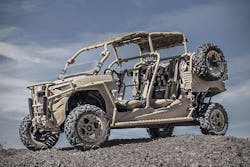DARPA asks industry for machine autonomy algorithms to enable unmanned vehicles to operate at manned speeds
ARLINGTON, Va. – U.S. military researchers are kicking-off a potential $19.5 million project to develop machine autonomy that enables unmanned ground combat vehicles to maneuver safely over rough off-road terrain at speeds a human driver could achieve.
Officials of the U.S. Defense Advanced Research Projects Agency (DARPA) in Arlington, Va., issued an updated broad agency announcement (HR001121S0004) on Friday for the Robotic Autonomy in Complex Environments with Resiliency (RACER) program.
Such a vehicle should be able to operate quickly over unstructured off-road terrain at speeds limited not by the autonomy software or processing time, but only by onboard sensor limitations, vehicle mechanical limits. Its speed should be similar to that of a human driver or a tele-operated vehicle.
The self-driving car industry is making rapid advances in on-road autonomous mobility of commercial cars, yet military off-road autonomy algorithms and capability development has lagged because of the increased complexity of the off-road problem, DARPA researchers say.
Military off-road must deal with 3D surfaces, hundreds of obstacles, incomplete mapping data, no defined road networks, and no driving rules. RACER seeks to develop machine autonomy algorithms that enable unmanned ground vehicles (UGVs) to operate at high speeds in open and complex terrain, with minimal interventions.
RACER phase-one will focus on developing, maturing, and demonstrating algorithms on lightweight tactical all-terrain vehicles (LTATV) in three DARPA-hosted field experiments.
RACER phase-two will mature technology, and increase system speeds over long off-road distances and complex maneuver terrain with a decreasing number of human interventions. Phase-two, moreover, will use a combat-size vehicle for field demonstrations, while keeping to the LTATV for algorithm maturation.
DARPA will provide LTATVs equipped with a sensor suite, computing resources, an optional baseline autonomy stack, vehicle and sensor models, and initial data sets.
Companies interested in participating were asked to submit abstracts by early November, and those submitting promising ideas were asked to submit full proposals no later than 14 Jan. 2021. Email questions or concerns to DARPA at [email protected].
More information is online at https://beta.sam.gov/opp/27e7a28ba5674144910ac1f2d73ef987/view.
